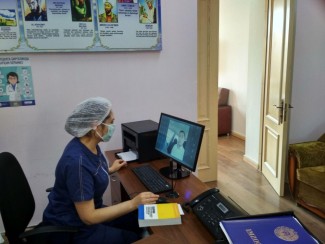UNODC Trained Treatment and Care Professionals Providing Valuable Support to People with Drug Use Disorders in Bukhara Region of Uzbekistan during COVID-19

Introduction of the quarantine measures in Bukhara Region, Uzbekistan made it extremely difficult to provide drug dependence treatment services to the population of the region. This negatively affected the quality of life of people with drug use disorders (PWDUD) and of their families, and in many cases led to a relapse of drug use disorders in patients.
In order to avoid collapse in this area and prevent worsening of the situation there was an urgent need to adapt the forms and methods of providing drug dependence treatment and care services to the existing conditions. Such response was initiated and carried out by the team of specialists comprising of 31 drug dependence treatment professionals from Bukhara Regional Narcology Center and district narcology points. To enhance the understanding on evidence-based treatment and care, all of the 31 professionals were trained on all courses of the Basic Level UTC training package during a series of echo-trainings conducted within the framework of the UNODC Global Project GLOJ71 “Treating drug dependence and its health consequences: TREATNET II”.
Due to the conducted activities, the access for people in need to receive the necessary information to address drug dependence problems and implement the preventive care has been greatly facilitated. By the middle of May 2020 each of the 20 treatment and care professionals of the Bukhara Regional Narcology Center provided online counseling on various topics to 3-5 people a day, which amounted to about 2,400 calls during a month of quarantine measures. 11 district addiction professionals conducted approximately 5-6 online consultations a day, with about 1,700 being undertaken in a month. Moreover, all 31 staff completed a total of around 4,000 online consultations per month. About 70% of PWDUD and members of their families are now covered with on-the-phone psychosocial support. About 30% of these cases were people concerned about family members becoming vulnerable to drug use. 12 professionals attended an online advanced training. About 15 appeals were made to the Crisis Center, and 36 patients were transported and hospitalized in a timely manner with the support of law enforcement agencies.